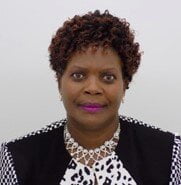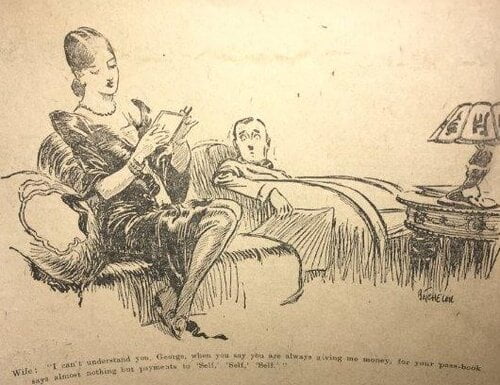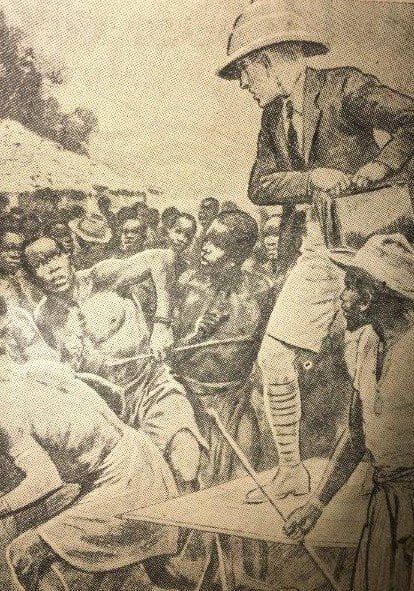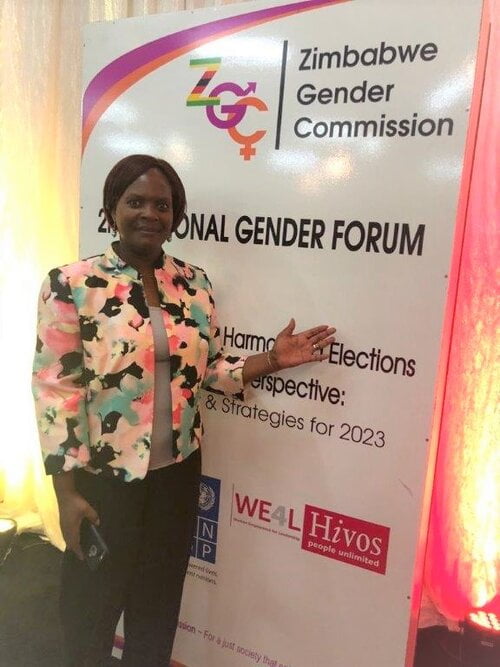Sibongile Mauye, a researcher and gender activist, is the third interviewee for our “Paper Trails” project, where we platform the work of students and early-career researchers studying British colonial histories. Sibongile is currently researching gender-based violence in Zimbabwe during the colonial period. MBC volunteer Emily Beswick spoke to her about searching for women’s voices in the archive, the limits of court documents and how her academic research interacts with her activist work.

Credit: Sibongile Mauye
Following an MA in Gender and Development at the University of East Anglia, where her thesis concerned domestic violence, Sibongile is completing her PhD at the University of Zimbabwe. She is a Commissioner on the Zimbabwe Gender Commission, a constitutional body committed to the advancement of gender equality.
Content warning: sexual violence
MBC: Could you briefly introduce your PhD research, and tell me about the archives you are using?
Sibongile Mauye: I am writing a social and economic history of gender-based violence in colonial Zimbabwe, looking at both the white settler and African community. My time frame is from 1930 to 1980, so it is a macro-study.
The archival sources I’m using are in the form of court cases, especially divorce cases. But I’m also looking at murder cases, assault cases … I even stumbled onto suicide cases when I saw in certain files that suicide cases were linked to domestic violence and gender-based violence cases.
These records are largely all housed in the National Archives of Zimbabwe. They were originally held in the High Court, before being deposited in the National Archives.
“Research in Zimbabwe on Gender-Based Violence has focused too much on the post-independence period without also looking at the pre-independence and colonial period. The history of GBV did not start with the Domestic Violence Act. ”
You did an MA thesis on domestic violence at the University of East Anglia before your PhD. Did that stimulate your research?
At a personal level, perhaps, I’ve always wanted to study interpersonal violence. Growing up in the village of Rusape [in North Zimbabwe] in the 1970s and 1980s, I witnessed domestic violence and that stimulated me to study the issue at Masters’ level.
Now I’m in the second year of my PhD, which has been much more influenced by my involvement in activism against gender-based violence. I’m currently a Commissioner on the Zimbabwe Gender Commission. The issue of GBV is in my heart and has been my passion really.
As a Commissioner, I have witnessed a lot of systemic GBV. I started to look at how to link the practice to the theory, and that is when I began to do sustained research into the history of GBV. There are continuities between colonial and post-colonial periods, and my research is about establishing those connections between history and the present.
I would say my research has three strands: gender history, human rights perspective and a gender analysis. This means looking at what the implications of GBV are in terms of gender equality.

Wife: I can’t understand you, George, when you say you are always giving me money, for your pass-book says almost nothing but payments to ‘Self,’ ‘Self,’ ‘Self.’
This newspaper cartoon shows issues of financial autonomy within the domestic space of the white settler home. Courtesy of the National Archives of Zimbabwe.
How do you use a gender analysis in your work? When you’re looking at court cases, what are you looking for?
In the court cases, I’m looking at the historical actors, asking what was their power? Do they have a voice? Who has the voice? And what are they saying? What are the implications in terms of their gender roles, the powers within the different relationships? And, finally, who has access to the law?
There are different players in the court. You have the interpreters, the judges themselves, the magistrates. Whose voice is being heard and why? Who has access to the law and why?
And if you look at the colonial period, especially in Zimbabwe, and also in Kenya and South Africa, experiences of African men and women were different because of the patriarchal society.
Gender affected their access to the law, and the way the cases were judged. We are not victimising the women, but when you do a gender analysis, you are able to expose all those dimensions.
“At the end of the day, the texts of court cases do not directly represent the voices of the actual people, the actual actors… It’s an interpretation of their voices.”
You previously talked about how African women weren’t victims of the legal system and how they used the system to their own advantage…
Yes, even though the law was not on their side, so to speak, women found ways of engaging with the law – to get divorces, for example. Even though they were minors, they could use their brothers and fathers to approach the courts and get their justice.
They also played to societal prejudices – such as the idea that women cannot murder, they cannot commit serious crime. As a result of the way they would position themselves in court, their demeanour, the judge might say ‘poor women, they can’t do this’, and they could get away with it!
Women were certainly not always victims. They stood up within difficult circumstances to challenge the system, to sometimes win, to sometimes lose. There was indeed agency.
When you’re using court documents, there’s things they include but also things that are absent. What do you find challenging about using these documents if you can’t find the voices you want to find?
At the end of the day, the texts of court cases do not directly represent the voices of the actual people, the actual actors. Those voices have been mediated through legal language, so that they are an interpretation of what it means in certain provisions of the law. I think a lot is lost in the process. The voice that you’re talking about might not be the real voice, so to speak – it’s an interpretation of the voice.
“Those kind of relationships are silent. They are not really mentioned in the archive.”
One also finds that there are certain things that are missing. For example, records of sexual abuse tend to be absent, especially during the early colonial period. But at the same time, in Zimbabwe and South Africa, there are big coloured communities that are evidence of interracial sexual relations. There was a law against these kind of intermarriages, so there were very few recognised marriages and partnerships. Those kind of relationships are silent. They are not really mentioned in the archive.
One cannot conclude this is evidence of only sexual abuse – there could also have been mutual relationships. However, when you take into account the power dynamics between the coloniser and the colonised, and especially women in terms of their social hierarchy, you can assume there were some sexual violations. There is some literature from Australia and other regions that shows there were indeed such violations. But it’s largely absent in the Zimbabwean archive, or at best difficult to find.

Did you encounter any problems accessing materials while conducting research?
I certainly did, and it’s something I’m still facing. There is a problem of access to court records, which are scattered across civil courts and criminal courts. Then, access is restricted by cost, because you have to pay to get to the archive. And finally, the current Covid-19 restrictions have had an impact. Sometimes you get certain information and want to return to the archive and verify it, but that’s hard now when the archives are completely closed. It’s a challenge doing this research using archives.
This picture, from the Rhodesia Herald on 15th January, 1931, shows general violence in the colonial period. Courtesy of National Archives of Zimbabwe.
How is your work relevant to current discussions around colonialism in Zimbabwe? Is there a lot of research into GBV in the colonial period?
I think research in Zimbabwe on GBV has focused too much on the post-independence period without also looking at the pre-independence and colonial period. Of course, the post-independence period has seen a lot of legal changes, for example the establishment of an Anti-Domestic Violence Council and also the 2007 Domestic Violence Act.
The intervention I am making is to historicise these developments. The history of GBV did not start with the Domestic Violence Act. I’m making linkages with the earlier colonial period. There are connections in issues around patriarchy, power, and access to economic resources from the 1930s to the present day.
I am also interested in the racial dynamics during colonialism because there was separate development, and almost social silos, between the white settler community and the black community. My historising all these developments brings out the intersection between race, gender and class.
“I see my research and activism as an interactive process.”

Sibongile at the National Gender Forum in Bulawayo, 2019. Credit: Sibongile Mauye
How does your work complement and inform your work as a Gender Commissioner?
As a Commission we investigate violations against gender. We look at who is being violated, how are they being violated, and what kind of solutions can be offered. We recognise the different roles which men and women play, the differential access they have sometimes to the law, and also the social barriers which men and women face in terms of using the law to their advantage. It’s about public education, but also about researching the systemic barriers against gender equality.
One might say my historical research is more theoretical, but I think it’s quite practical. Most victims of rape are young girls – why? From a power perspective, they might not have the voice to be able to challenge somebody, perhaps in the family, who abuses them. As a Commission, we attempt to give those people voices, give voices to children, women, and also men, because gender equality is not just about women only. My PhD research, I think, enriches the work that I’m doing with the Gender Commission.
After my PhD, I intend to continue to contribute to knowledge. I don’t see it as a case of “now I’m doing my PhD and after I do my PhD, then I’ll do this”. I see my research and activism as an interactive process.
You can follow Sibongile’s work on Twitter at @MauyeSibongile, and the work of the Zimbabwe Gender Commission at @GenderZimbabwe.